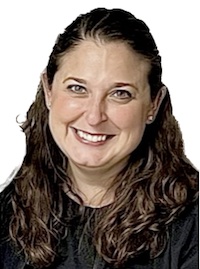Mammograms: an effective first line of defense against breast cancer
By Stephanie Aquilina, mammographer at Medina Memorial Hospital
In our busy lives, it’s easy to overlook routine health check-ups until we are faced with a problem. However, some screenings, like a mammogram, are crucial to ignore.

Stephanie Aquilina
Mammograms are not just for those with a family history of breast cancer or older women; they hold immense importance for every individual. In this article, we will delve into the significance of mammograms for everyday individuals and the role it plays in early detection and prevention.
Understanding Mammograms
Mammography is a specialized medical imaging used to examine breast tissue. It involves taking X-ray images of the breasts, which are then interpreted by radiologists. Mammograms can detect abnormalities in the breast tissue, such as lumps or masses, often before they can be felt through physical examination.
Early Detection Saves Lives
One of the most compelling reasons for individuals to consider yearly mammograms is the role they play in early detection. Breast cancer, when caught in its early stages, is highly treatable. The American Cancer Society reports that the five-year survival rate for localized breast cancer (cancer that has not spread outside the breast) is around 99%.
Yearly mammograms can detect breast cancer in its earliest stages, most often before symptoms develop. This means that the individuals can receive treatment when the cancer is most responsive to therapy, increasing their chances of survival and minimizing the need for aggressive treatments.
Early detection means taking it upon yourself to do monthly self-breast exams. Early detection can also mean easier treatment.
For Every Age and Risk Level
Contrary to popular belief, mammograms are not exclusively for older women. While breast cancer risk increases with age, it can affect individuals of all ages and genders. In fact, approximately 1 in 8 women in the United States will develop breast cancer during her lifetime.
Mammogram guidelines vary, but generally, women should start considering annual mammograms around the age of 40. However, it’s essential to consult with a healthcare provider to determine the most appropriate screening schedule based on individual risk factors, which could include family history, genetics, and personal health history.
Approximately 50% of females have dense tissue in their breast. The dense tissue is normal but it will increase the risk of breast cancer. Talk to your doctor about your preventative measure for this dense tissue.
Moreover, breast cancer is not limited to women. Men can develop breast cancer as well, though it is rare. Men with a close relative with breast cancer or certain genetic mutations may benefit from genetic testing as a preventive measure. 1 in 5 men with breast cancer have a close relative with breast cancer.
Peace of Mind
Beyond the medical benefits, mammograms can provide help peace of mind. Many people worry about their health, especially when there is a family history of breast cancer. Yearly mammograms can offer reassurance, knowing that you are actively monitoring your breast health.
Additionally, for those who are experiencing breast symptoms such as pain or changes in breast tissue, diagnostic mammograms can help rule out serious issues. Talk to your doctor for your next step. This can reduce anxiety and ensure that the individual receives appropriate medical care when needed.
Financial Considerations
Some may argue that mammograms are expensive, but many health insurance plans cover them as part of preventive care. Under the Affordable Care Act in the United States, mammograms are one of the essential health benefits that insurers must cover without cost-sharing.
Even for those without insurance, many healthcare facilities offer free or low-cost mammogram screenings, particularly during Breast Cancer Awareness Month in October. These resources make it more accessible for everyone to prioritize their breast health.
Remember, mammograms are not just for a select group of individuals. They are a vital tool in the early detection and prevention of breast cancer, which can affect people of all ages and genders. Yearly mammograms can save lives, provide peace of mind, and offer financial support through insurance coverage and community resources.
Taking charge of your health should be a priority, and mammograms are a crucial step in that journey. Consult with your healthcare provider to determine the right screening schedule for you. Remember that early detection through mammograms can make a significant difference in your overall health and well-being. Don’t wait until a problem arises; prioritize your breast health today.
(Stephanie Aquilina is a member of the Imaging Department at Medina Memorial Hospital (Orleans Community Health), where she has been for 20 years (as mammographer for the last 14 years). She is a radiologic technologist, registered rad tech, and registered mammography.)









































































